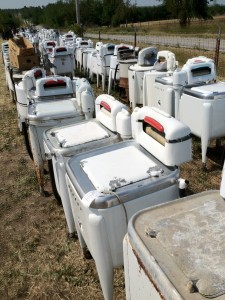Wringer Wash Machines Reflect Amish Work Ethic
Last summer my husband and I attended an Amish school fund-raiser auction in Jamesport, Missouri. The auction was a beehive of activity of all kinds. Three auctioneers yelling at the same time. People from all over the state wandering through rows and rows of farm equipment, furniture, and dishes and pots and pans. The items that caught my attention immediately were the wringer wash machines–hundreds of them. They were mostly used, but some looked brand new. I knew many Amish families use wringer wash machines that have been retrofitted to run on propane, but I’d not really given any thought to what that means. It makes the job of doing laundry for families that typically have seven or eight or more children easier because they don’t have to wash them by hand. However, it’s certainly not easier by English (non-Amish) standards.
If you’ve ever done laundry with a wringer wash machine, you know it’s not easy, compared to using a modern day wash machine with a spin cycle. I know because as a youngster it was my job to do laundry for our family of seven. We had a wringer wash machine and no dryer. So a typical laundry day involved gathering the laundry on the covered back porch, sorting it, running a hose to the wash machine to fill it, and then filling two large sinks with cold water. I ran the clothes, piece by piece, through the wringer into the rinse water in the first sink, ran them through the wringer again into the second tub for another rinse, and then wrung them out a third time into a basket. From there it was on to the backyard to hang them on the clothesline.
As you can imagine, this was a long, tedious, job. I never thought much about it, though. We’d always done it that way. The time a huge, black, hairy spider leaped from the clothes basket into the sudsy water, riding the waves into I wacked him out with a newspaper—that stands out in my mind. The clean smell of the soap and bleach still lingers in my memory and the pleasant, steady, swish, swish of the water being agitated in the machine—those memories still surface when I smell clothes soap even now. As I write my Amish romances, I imagine the young Plain women doing the same thing. Inhaling the scent of clean and knowing they’re taking good care of their families.
The decision to use a wringer wash machine by some Amish communities would not be a decision made lightly. They don’t shy away from hard work and they’re thoughtful about embracing modern day conveniences that might lead them astray from their commitment to keep themselves apart from the world. They don’t have to do it the easy way. They see a value in being tired at the end of the day because they’ve worked hard. Their way of life certainly helps me keep in perspective the concept of hard work. It’s good for the soul and the body.
Last 5 posts by Kelly Irvin
- Trip to Missouri sets stage for Amish romance - August 31st, 2013
- Amish newspaper reflects faith, love of community - December 15th, 2012




The wringers had the potential to be dangerous. I got my fingertips pinched a couple of times. My brother (yep, my widowed mom made him help too) got his hand stuck once. There was a release bar so we smacked it quick to get his hand out. We knew of some kids who got stuck up to near the elbow before someone cut the power to stop the wringers. They didn’t have the release bar.
Like you, I sometimes miss the smell of the soap and the bleach; I especially miss the smell of the laundry dried outdoors. And we certainly didn’t have any trouble sleeping after a good day’s work.
[Reply]
I know what you mean, Ellen, I was always afraid of getting my hand in that wringer. I don’t remember having a release bar, but I imagine it did. I didn’t mind hanging clothes on the line in the summer, but winter was harsh. I didn’t even mind ironing, I still find it soothing, if I have the time . . . .
[Reply]